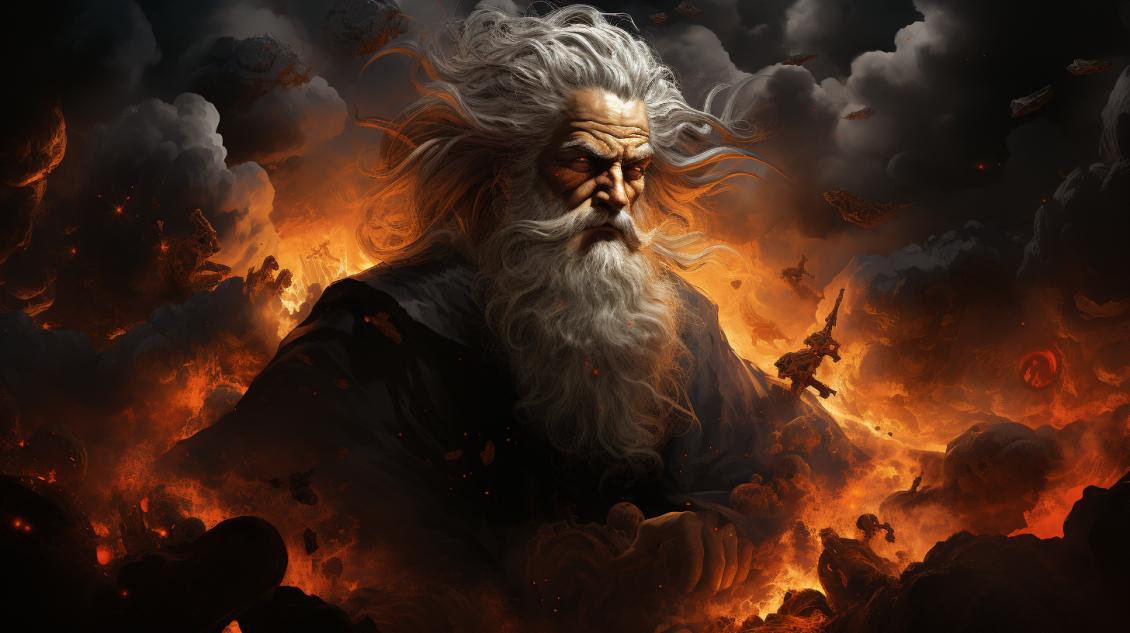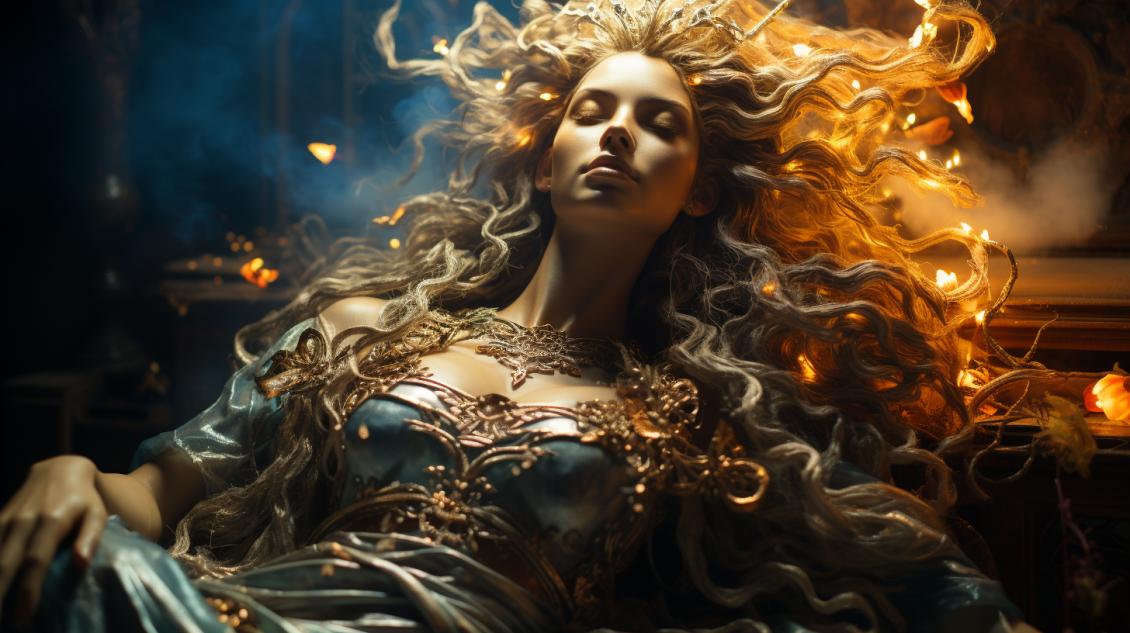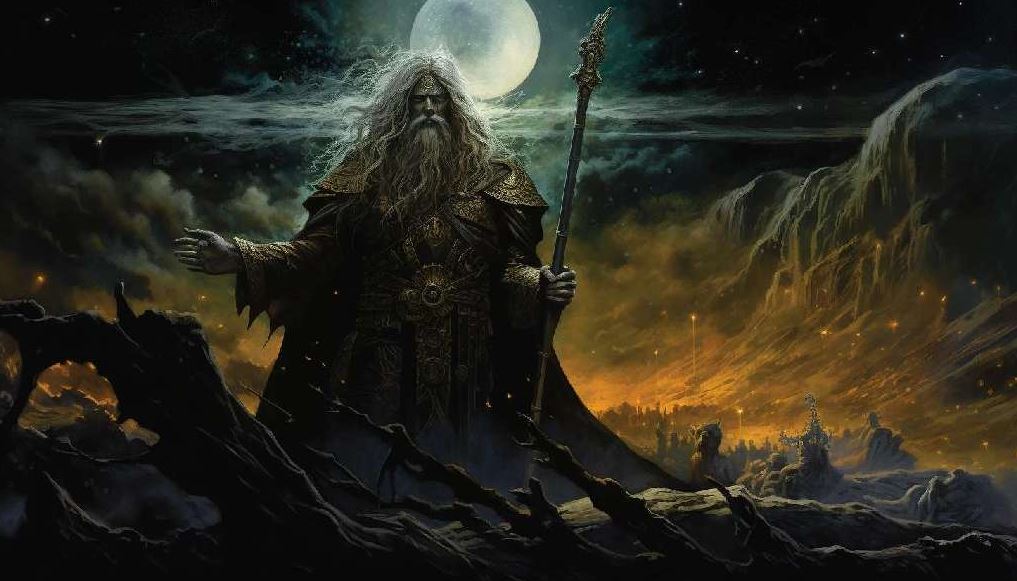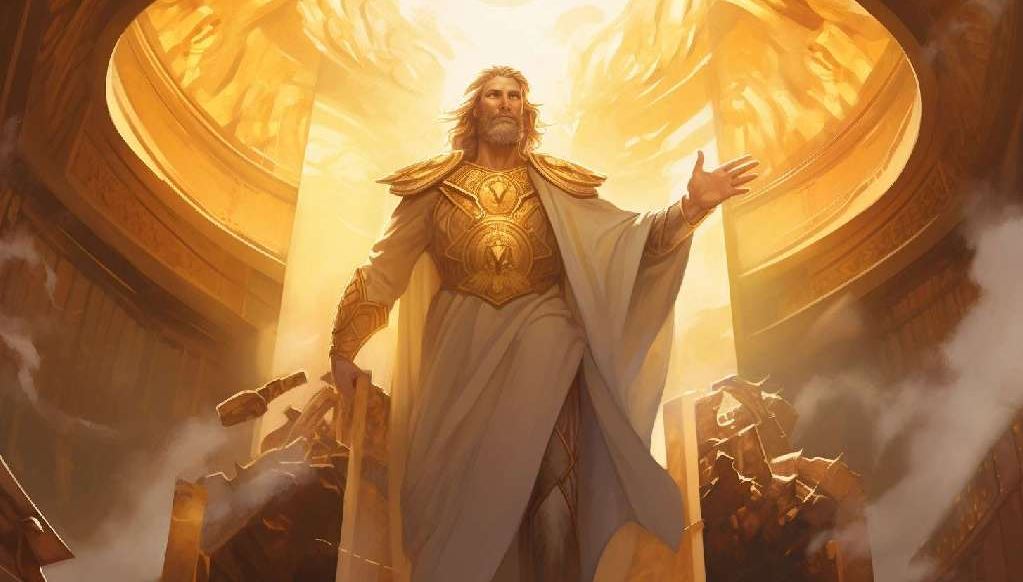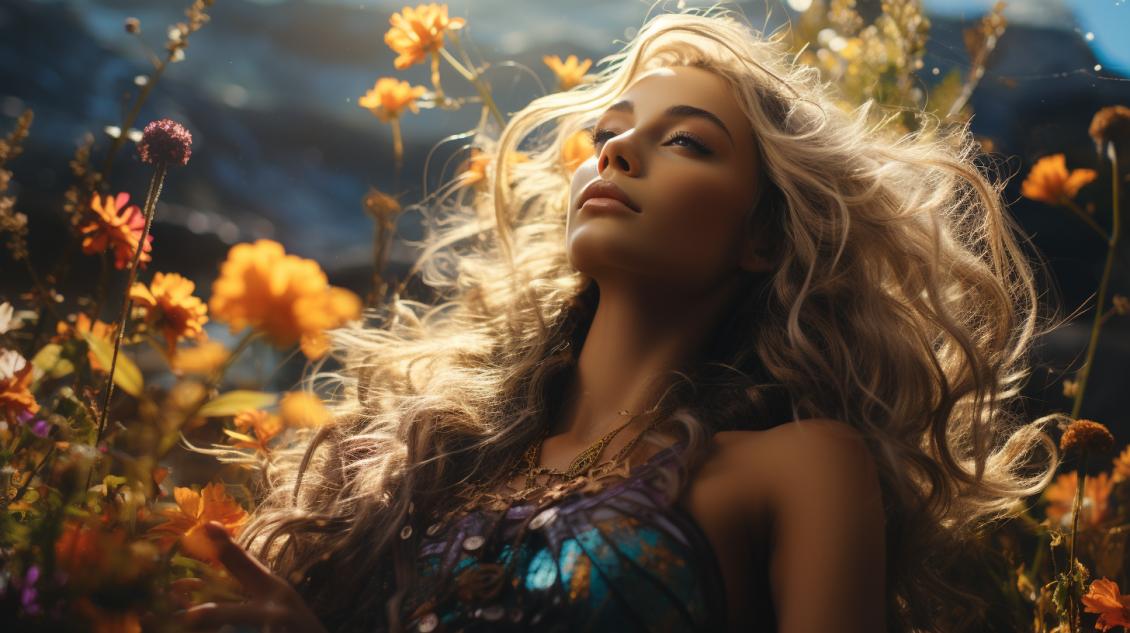Norse God Aegir: Exploring the Mighty God of the Sea in Norse Mythology
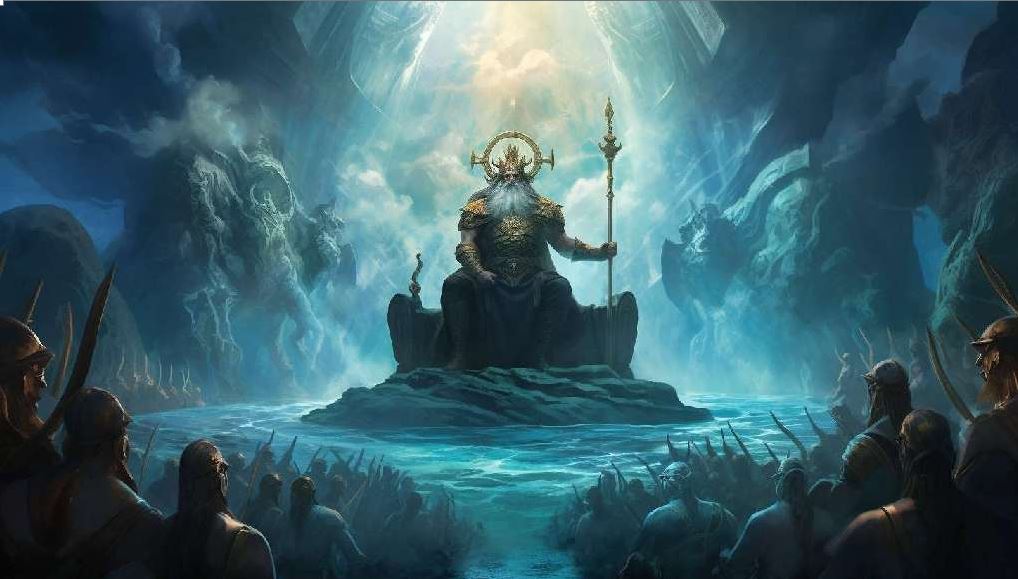
Ægir, also known as the Norse god of the ocean, holds a significant place in Old Norse mythology. He is known for his role as a generous host and entertainer, welcoming the gods into his hall.
Ægir, a Jotunn by origin, is often referred to as the Norse sea god, embodying the powerful and unpredictable nature of the sea.
Married to the goddess Ran, together they rule their underwater realm.
Ægir’s prowess in brewing earned him fame, particularly for his mead of the sea. With connections to the Aesir gods and intriguing relationships with other deities, Ægir’s influence in Norse mythology and popular culture is extensive.
Explore the captivating tales and symbolism surrounding this powerful figure, whose mythology is enriched by stories of his hospitality and the grand feasts he hosted for the gods.
The Origins of Ægir: Exploring the Norse God of the Sea
Welcome to a fascinating journey into the realm of Norse mythology, where we delve into the origins of Ægir, the mighty god of the sea.
In this section, we will explore the mythological background of Ægir and his significant place in Old Norse mythology, highlighting his role among the pantheon of Nordic gods.
The Mythological Background of Ægir
Ægir’s roots can be traced back to ancient Norse mythology, where he emerged as a prominent deity associated with the forces of the sea.
In the cosmology of the Norse, Ægir symbolizes the vast and unknowable power of the ocean, a realm that both fascinated and frightened the seafaring people of old. Known as the Norse god of the ocean and also as Ægir, his presence is a testament to the deep reverence and fear that the Norse held for the sea.
Stories and tales have described Ægir as a colossal figure, often depicted as a giant of the sea, known as the Jotunn. His domain encompassed the depths, where he reigned over underwater landscapes that held mysteries and dangers.
This Norse ocean god was celebrated for his hospitality, with his hall being a place where gods gathered, illustrating the interconnectedness of Ægir with the broader pantheon of Norse mythology gods.
In this mythological background, Ægir embodied the raw and untamed aspects of the ocean, commanding both respect and fear. As the Norse god of the ocean, his narratives are pivotal in understanding how the Norse viewed the natural world around them, attributing both creative and destructive powers to deities like Ægir.
His mythology, deeply rooted in the cultural and religious practices of the Norse, offers insights into the complex relationship between humans and the natural environment in ancient Norse society.
Ægir’s Place in Old Norse Mythology
Within the intricate tapestry of Old Norse mythology, Ægir, also known by his name Gymir, found his place as a significant deity revered by the Norse gods.
Despite being classified as a giant rather than a god, Ægir, the beautiful jotunn of the old Norse sea, maintained a harmonious relationship with the Aesir, the major gods of the Norse pantheon.
As a gracious and generous host, Ægir often opened his halls to welcome the gods and goddesses, serving as a gathering place for divine feasts and celebrations. His ability to create exceptional mead, brewed from the waters of the sea, further solidified his significance in the mythological landscape.
Let’s delve into the details of Ægir’s marriage to Ran and their mystical realm, as well as explore the significance of his children and their connections to the sea and river gods.
Ægir’s Marriage to Ran and their Realm
Ægir is married to Ran, a powerful goddess associated with the sea and its treasures. Together, they reside in a magnificent underwater realm, where they rule over the depths and govern the fates of seafarers.
This relationship highlights the powerful bond between the old Norse sea god Ægir and the sea itself, embodying the essence of the ocean’s vast mysteries.
Ran, often depicted as a captivating enchantress, has a penchant for capturing drowned sailors and bringing them to their watery domain.
This aspect of her character underscores the dangerous allure of the sea, as well as the respect and awe it commanded during the Viking Age, when Norway was settled and seafaring was a way of life.
Ægir’s Children and their Significance
Ægir and Ran are blessed with children who hold immense symbolism in Norse mythology. Their offspring underscore the connection between the gods and the natural elements, particularly the sea and river gods.
The Daughters of Ægir and their Representations
- Nine daughters are born to Ægir and Ran, representing the waves of the sea. These beautiful jotunn daughters are symbols of the sea’s might and beauty, each embodying different characteristics of the ocean’s waves.
Their names, like crashing waters, are mesmerizing: Himinglæva, Dúfa, Blóðughadda, Bylgja, Bara, Kolga, Unnr, Hefring, and Uðr.
Each daughter embodies a particular aspect of the ocean’s power, from fierce storms to calm tides.
The daughters’ influence extends beyond mere symbolism. In Norse poetry, often referred to as the poem, they are invoked as protective spirits by seafarers, safeguarding their voyages and guiding them through treacherous waters.
The Mysterious Relationship with Gerðr
Ægir’s son, Snær, is mentioned as one of his children. However, another significant figure associated with Ægir is Gerðr, who is believed to be his daughter or stepdaughter. Gerðr is renowned as the wife of the fertility god, Freyr. The exact nature of their relationship and Gerðr’s lineage remains a captivating mystery within Norse mythology, says that Ægir who is called Ægir in old Norse name, holds a unique place in the pantheon as the Norse god of sea.
The familial ties of Ægir give insight into his divine influence over the sea and the intricate web of relationships that intertwine the gods and goddesses of Norse mythology. The prose introduction to the ancient texts often highlights Ægir as a central figure, known not just for sea dominion but also for his role as the father figure to many lesser-known deities in the Norse cosmos.
Ægir’s Role as a Host and Entertainer
The Generosity and Hospitality of Ægir
One of the remarkable aspects of Ægir’s character is his reputation for generosity and hospitality. As the host to the gods in his magnificent hall beneath the sea, he ensures that all who visit are treated with the utmost warmth and care.
Known for his friendly demeanor, Ægir welcomes his guests with open arms, providing them with food, drink, and entertainment. The halls and chambers of Ægir’s underwater realm are crafted to reflect the vastness of his domain, filled with the echoes of the same name revered across the Norse myths.
The Feast of the Gods
At
the feast of the gods, Ægir, often called the Norse god of ocean, displays his prodigious skills as both a host and a brewer. The gods are served with the famous mead of the sea, which Ægir brews in his halls.
This divine beverage, beloved by Ægir’s fellow deities, including Hler, who is another Norse water god, symbolizes their shared heritage and the powerful connections among the deities associated with the ocean and its myriad mysteries.
Ægir’s renowned feasts are legendary among the gods. He orchestrates elaborate banquets where both the Aesir and other divine beings gather to indulge in merriment and celebration. It is said that during these festivities, the vastness of his domain transforms into a vibrant setting filled with laughter, music, and joy, reflecting the kennings for instance, the richness of Old Norse ægir culture.
Offerings and Sacrifices
In honor of Ægir’s hospitality, sailors and seafarers would make offerings and sacrifices to appease him before embarking on their journeys or to express gratitude for safe passage. These gestures were seen as a way to maintain harmonious relations with the god of the sea, seeking his goodwill and protection during their maritime expeditions.
These rituals often took place on the island known as Hler Island in modern terms, connecting them directly to that the Germanic traditions revered.
Ægir as the Brewer of Gods: The Famous Mead of the Sea
Among Ægir’s many talents, his brewing skills are renowned throughout the divine realms.
He is known as the master brewer of the gods, particularly celebrated for his production of the famous mead of the sea, which holds a central place in Norse mythology.
Ægir, who is synonymous with the old Norse name for sea, wields this title with pride and responsibility.
This unique beverage, crafted from the depths of the ocean, is said to possess extraordinary qualities and flavors that cannot be replicated elsewhere.
The name Ægir itself, a noun for sea, resonates through the annals of Norse mythology, heralding his status as the sea jotunn and the revered Norse god Ægir.
The Magic and Art of Brewing
Ægir’s brewing abilities are shrouded in mystique and magic.
Through meticulous craftsmanship and ancient brewing techniques, he creates an elixir that captivates the taste buds of the deities. The mead of the sea is believed to bestow strength, wisdom, and inspiration upon those fortunate enough to partake in its divine essence, echoing the profound role that Ægir plays in the pantheon as a provider and protector.
The Favor of Odin
Odin, the All-Father and chief among the Aesir gods, holds Ægir’s mead in high regard. It is said that the mead brewed by Ægir is the preferred choice of Odin himself, as it exemplifies the pinnacle of brewing artistry and flavor.
This acknowledgment from the ruler of the gods further solidifies Ægir’s status as an esteemed host and brewmaster.
- Ægir’s generosity and hospitality know no bounds as he welcomes the gods to his underwater hall.
- His renowned feasts bring together divine beings for joyous celebrations and merriment.
- Sailors make offerings and sacrifices to Ægir as a gesture of respect and to seek his favor on their maritime journeys.
- Ægir’s brewing skills are legendary, and his famous mead of the sea is a divine elixir enjoyed by the gods.
- The mead of the sea is believed to possess unique qualities and flavors that cannot be replicated.
- Odin himself favors Ægir’s mead, solidifying its reputation as the pinnacle of brewing excellence.
Ægir’s Connections with the Aesir and Other Gods
Ægir, the Norse god of the sea, shares a friendly and amicable relationship with the Aesir gods, the principal deities in Norse mythology.
Despite being a giant rather than a god, Ægir is highly regarded and welcomed by the Aesir into their halls of Asgard. This alliance between Ægir and the Aesir serves as a reflection of their shared responsibilities and connection to the elements, further solidifying their interwoven roles in the Norse cosmos.
The Friendly Relationship between Ægir and the Aesir
Ægir’s cordial rapport with the Aesir gods sets him apart from other giants in Norse mythology. He is known to host elaborate feasts and gatherings for the Aesir in his great hall beneath the waves.
These gatherings provide an opportunity for the gods to socialize, strengthen alliances, and exchange stories and wisdom. Ægir’s generous nature and hospitality make him a beloved figure among the Aesir, who eagerly attend his gatherings to revel in his company.
Other Deities Associated with Ægir and the Sea
In addition to his relationship with the Aesir, Ægir has connections with various other deities associated with the sea. One such deity is his wife, Ran, who rules the depths of the ocean and is often depicted as a fearsome figure capturing drowned sailors in her net.
Together, Ægir and Ran govern their submerged realm, holding sway over the mysteries and wonders of the sea.
Furthermore, Ægir’s association with the sea extends to his children, particularly his daughter’s personifying waves.
These daughters, often referred to as the Nine Daughters of Ægir, embody different aspects of the ocean’s power, ranging from calm waters to fierce storms.
Each wave carries a distinct name and significance, adding depth to Ægir’s family connections and his influence over the vast expanse of the sea.
While the exact nature of Ægir’s relationship with certain other sea-related deities like Hlér and Gymir remains elusive, their interconnectedness hints at the complex network of divine entities that shape the Norse mythological landscape.
Ægir in Norse Mythology and Popular Culture
Ægir’s Representations in Literature and Art
In the realm of literature and art, Ægir has left an indelible mark as a captivating character from Norse mythology. Writers and poets throughout history have drawn inspiration from his enigmatic persona and his connection to the sea.
From epic sagas to contemporary novels, Ægir’s presence can be felt in various works of literature.
In the realm of art, Ægir is often depicted as a towering and powerful figure, adorned with symbols of his authority over the sea.
Paintings and sculptures portraying Ægir’s underwater realm, filled with mythical creatures and swirling waves, showcase the awe-inspiring nature of his domain.
Artists have captured the sense of mystery and power that surrounds Ægir, making him a subject of fascination and admiration for art enthusiasts.
Ægir’s Influence on Modern Culture and Symbolism
Ægir’s influence extends beyond ancient myths and legends, permeating modern culture in various ways. His association with the sea and his role as a gracious host has made him a symbol of hospitality and generosity.
In popular culture, Ægir’s image can be found in movies, TV shows, and video games, where he often embodies the powerful and untamed forces of the ocean.
The symbolism of Ægir’s brewing skills and his mead of the sea has also resonated with contemporary audiences.
It represents the art of craftsmanship and the ability to create something extraordinary.
Ægir’s mead is often seen as a metaphor for the pursuit of excellence and the rewards that come from dedicating oneself to a craft.
- Ægir’s image and themes can be found in maritime-themed festivals and events, celebrating the connection between humanity and the sea.
- Ægir’s presence in popular culture serves as a reminder of the ancient Norse mythology and its enduring relevance in today’s world.
- The figure of Ægir inspires awe and fascination, reminding us of the vastness and power of the natural world.
Through literature, art, and popular culture, Ægir continues to captivate and intrigue audiences, keeping alive the rich mythology and folklore of the Norse gods.
.
.











